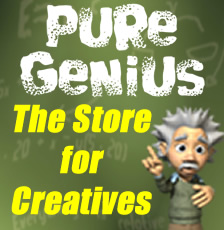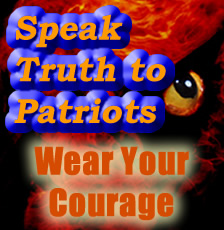Interview: ‘Creedmoria’ Director Alicia Slimmer Admits Coming-of-Age Flick is All About Her
(First published on Blogcritics.org)
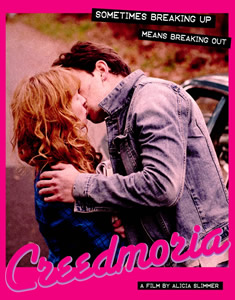 Creedmoria, a film by first-time writer/director Alicia Slimmer, made its SoCal premier at the Dances With Films Festival in Hollywood, June 3. It chronicles the efforts sweet-sixteen Candy Cahill, played by Stef Dawson (Annie Cresta in the Hunger Games films), to come of age in one of the most dysfunctional families in movie history.
Creedmoria, a film by first-time writer/director Alicia Slimmer, made its SoCal premier at the Dances With Films Festival in Hollywood, June 3. It chronicles the efforts sweet-sixteen Candy Cahill, played by Stef Dawson (Annie Cresta in the Hunger Games films), to come of age in one of the most dysfunctional families in movie history.
Creedmoria derives its name from the neighborhood mental institution in this fictional 1980s Queens neighborhood. Creedmoria was an institution and so is the family. As I watched the film, I hoped for Slimmer’s sake, that this movie wasn’t too autobiographical. It turns out that it was.
But there were lighter moments, too. Who couldn’t love dog fart jokes, prank phone calls and toga parties? The cast was great and got to deliver lines like, “In the name of the father and the son and holy mother of God what are you doing to my rug?,” or “You’re happy all the time; that just ain’t normal.”
Slimmer’s wit doesn’t stop with screenplays, as the interview below demonstrates.
I never read director’s notes before watching a film. As I watched, I wondered if the film might be autobiographical.
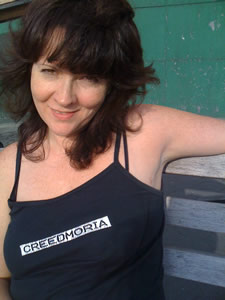
Writer/Director Alicia Slimmer
Creedmoria is semi-autobiographical. Names have been changed to protect the guilty. Seriously, much of the movie comes directly from my experience surviving high school in Queens during the 80s, outside the gates of Creedmoor Psychiatric Hospital. Billy (played by Steve Cavanaugh) was based on my boyfriend, who dropped out of school and tattooed my name on his arm the day I was hoping to break up with him. I continued seeing him for six more months. I worked at fast food place for a manager who locked me in the restaurant to clean the excrement off the wall. The real ending to that story had my same pyscho boyfriend threaten him with a lead pipe to let me out and then we slashed his tires before he drove me home. I never had the triumphant moment Candy does, with her speech at the end. I just quit.
Promoting your film as Breakfast Club meets Little Miss Sunshine is pretty gutsy. The feel to me was more somber, like The Graduate. Did you start out emulating these films as your goal, or did it just turn out that way?
Lucky for me, I didn’t coin that comparison — though, I do love it. I never watched movies as a kid, so I only saw the Breakfast Club two years ago, right before shooting. The only film I ever sought out to emulate was American Beauty because I love how it is the perfect combination of dark themes, hilarious moments, and moments of utter beauty and tenderness. Laugh-out-loud scenes of Lester Berman busting his wife in the drive-through. And staggering tragedy, like having a bullet put in his head. That, and Moonstruck, strike me as the perfect movies to set up Creedmoria.
The title had me puzzled for a while. If I had grown up in New York instead of a suburb of LA, would I have immediately recognized this?
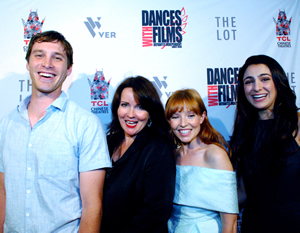
Creedmoria team, from left, James Kelley, Alicia Slimmer, Steff Dawson, and Giuliana Carullo
No, not at all. The titles is terrible, I agree. What is this, a horror movie? Crematoria? The thing is, people around me — the Exec Producer, some of my cast, my Production Designer — all got super attached to the name and the branding of the name. I think a far better title would be Tough Love, or Normaltown.
The music was great and added fun to the film. Did you pick the music as you were writing, or was this added later?
I love you for loving the music because it’s probably the thing I am most proud of. I had worked with a music supervisor early on who was great at trying to help me retrofit today’s music to the sound of the 80s. And he had some great bands/ideas. And truthfully, it was all in the name of saving the mighty dollar. But something felt terribly wrong. I’ve had a Creedmoria playlist on my phone since 2004. Certain songs wrote certain scenes. “Wishing”, by Flock of Seagulls wrote the ending. “Boy” by Book of Love wrote one of the Act changes. “Can’t You See”, one of the greatest rock songs of all time, by Marshall Tucker, was a song about the domineering mother, Angela: “Can’t you see, what that woman, Lord, is doing to me.”
What was the process? How expensive was licensing all this music? Was there anything you really wanted, but couldn’t get?
My husband and I just finished paying off our credit card debt due from the movie when he said: “Darn it, have the soundtrack you want. We’ll borrow the money if we have to.” So I stepped into the role of Music Supervisor, found a badass licensing woman to handle the fees/licenses, and I created my dream soundtrack.
I couldn’t get clearance on three songs and I’ll tell you which ones and why not getting one of them sucked so bad.
I wanted ELP’s “Lucky Man” for the funeral scene and because the band is tight-fisted with their songs, they refused to clear it. Lucky for me, because it led me to choose Gordon Lightfoot’s “If You Could Read My Mind,” which, unanimously, is the crowd favorite. I couldn’t get Journey’s “Stone in Love”, which was an oldie and a goodie, way before Steve Perry’s love ballads made up their canon. The word on the street is Journey is impossible to get. I wanted it for the first time Candy and Billy get together, makeout, drag race. BTO is an okay choice, and I mean no disrespect to the band, but “Stone in Love” would’ve matched the mood more.
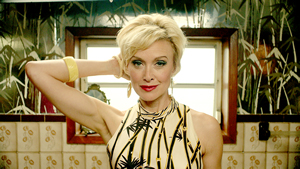
Rachel de Benedett as the mom you’re glad you didn’t have in ‘Creedmoria’
But the biggest crime was not having Aerosmith’s “Back in the Saddle” for when Angela (played by Rachel DeBenedet) comes storming home and Danny (played by James Kelley)is rocking out in the living room. The way Angela comes up the path, in slo-mo, was amazing with that heavy bass beginning and then you see the rage on her face and all you hear is “I’m baaaaaaaack.” It would’ve made for a good laugh…but the bandmates are fighting and even though one of my co-producers is good friends with Steven Tyler’s best friend, whom we sent a clip to and everything, is was a no-go.
The cast was great. How much input did the actors have in creating the characters? Did any of them come up with surprises for you as a director?
Thank you so much. It’s the one thing people write me about a lot, how great the cast is. Each actor has their own style of working and no two of them work the same. They trusted me to take care of them and so from the minute I said “Action,” I had to trust them by letting go and letting them do what they do best. They’re all super professional with varying backgrounds in film, TV and theater and I was the lucky one to work with them.
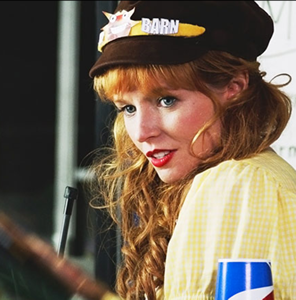
Hunger Game’s Steff Dawson as Burger Barn girl in Creedmoria
One of the nice additions to the movie is the song shared between Candy and her father, Ernest (played by Ray Abruzzo). Ernest, was based on my own dad, a kind and gentle spirit who dropped dead in front of me when I was seventeen. It had a very lasting effect on me. His favorite song that he used to sing was “Young at Heart.” I told Ray and Stef, who play the characters, how I was hoping to find a way to get the song in the movie. They both came up with the whistle as their own secret language and I think it adds such tenderness to their relationship.
What would you like people to take away from the experience of seeing this film?
You know, you called the movie somber and I don’t think it’s somber. What I’m finding is when an audience watches it together in the theater, the energy and the laughs are palpable. They cheer when Candy walks away from her boss. They get goosebumps with the climax building in the Foal’s song at the end when Candy and Sean break out of the house. I wish the whole world could see it on the big screen. I wish I could find a distributor who wants to see it that way, too. Laughter is best shared. I’d love it if people leave the theater feeling high — high on the music, high on the fact the underdog got away, high on the possibility of watching someone have courage to do something brave like walk away from everything and everyone she’s ever known.
https://vimeo.com/88400211

